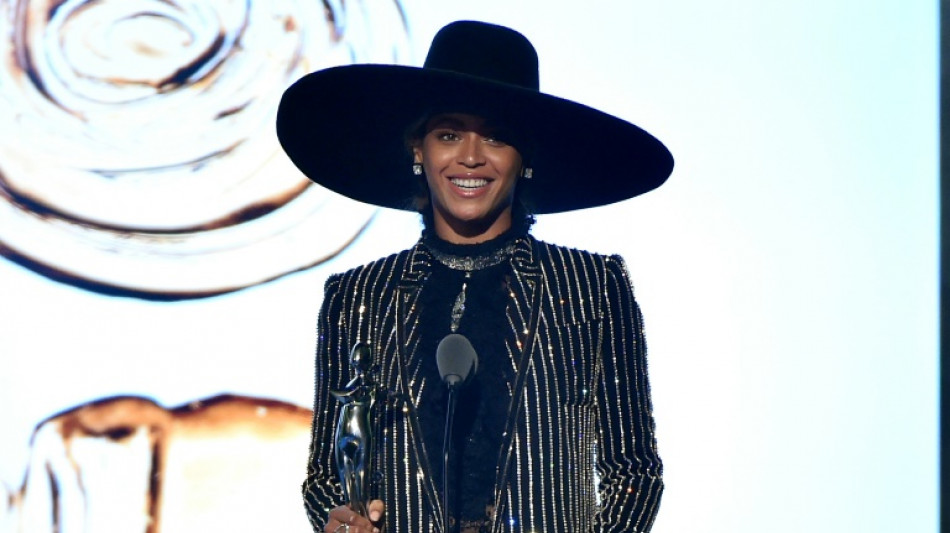
Beyonce's 'Cowboy Carter' drips history -- and joy

Beyonce's "Cowboy Carter" is a full-throated ode to her southern roots, a rollicking revue of an album that also deals a vital history lesson on the Black lineage of country music.
The 27-track, highly anticipated record out Friday is the second act of her "Renaissance" trilogy, a sonically diverse jamboree flavored with strings and pedal steel guitar.
Beyonce has been a versatile showbiz fixture for nearly three decades, but for all the caps she's worn, the Houston-bred megastar's cowboy hat has stayed within reach: Queen Bey has always been country.
But even the powerful artist -- who has more Grammy wins than any other artist in the business, ever -- has brushed up against the overwhelmingly white, male gatekeepers of country music who have long dictated the genre's perceived boundaries.
She notably received racist comments after performing what was then her most country song to date, "Daddy Lessons," at the 2016 Country Music Association Awards alongside The Chicks.
And while her first two singles off the album were released last month to chart-topping acclaim and ecstasy from fans, there were also predictable, bigoted eyebrow raises from some circles.
At the same time, news of her album magnified a wider conversation on the long history of Black artists in country music, and the persistent racist backlash they've continued to experience in those spaces.
A Texan raised by a mother from Louisiana and father from Alabama, Beyonce tackled the perceived "controversy" over her full country turn on the track "Ameriican Requiem."
"They used to say I spoke, 'Too country' / Then the rejection came, said I wasn't, 'Country enough' / Said I wouldn't saddle up, but if that ain't country, tell me, what is?" Beyonce sings on the track whose musical allusions include Buffalo Springfield's classic "For What It's Worth."
"Tread my bare feet on solid ground for years / They don't, don't know how hard I had to fight for this."
And with technical mastery she delivers a blend of styles including various country subsets as well as rap, dance, soul, funk, rock and gospel.
It's a full-color display of just how rich music can grow outside dusty strictures of genre.
"Genres are a funny little concept, aren't they?" says an intro to "Spaghettii."
"In theory, they have a simple definition that's easy to understand -- but in practice, well, some may feel confined."
- Beyonce X Dolly -
The album is rife with socio-cultural nods both in lyric and style, a honkified celebration of country-western's musicography and influences that's also grounded in the African American spirituals and fiddle tunes rock blossomed out of.
And "Cowboy Carter" features genre elders in the form of a broadcast from a fictional radio station -- a hint at well-documented struggles women and people of color still face getting airtime on country radio -- whose hosts included Willie Nelson, country pioneer Linda Martell and the legend herself, Dolly Parton.
In performing a rendition of Parton's "Jolene" -- the singer fears her partner might leave her for another -- Beyonce recalls her seminal album "Lemonade" that excavated the infidelity of her husband, Jay-Z.
Parton's intro lays bare the parallels in describing "that hussy with the good hair," a direct reference to the 2016 Beyonce track "Sorry."
Also on the sprawling album is a Beyonce cover of Paul McCartney's "Blackbiird," stylized with a double-i spelling.
McCartney wrote the 1968 song about the Little Rock Nine, Black teenagers who became Civil Rights Movement icons when they were the first to enter a previously all-white high school in Arkansas, ushering in desegregation in the US south.
- Beyonce-style ode to joy -
But as is her custom, Beyonce seamlessly blends her socio-political commentary with a full-blown party, a celebration of sex, mirth and her own self-love.
"Ya Ya" is a sultry, psychedelic soul mashup that manages to sample both Nancy Sinatra's "These Boots Are Made For Walkin'" and The Beach Boys, while still dropping point after point.
"My family lived and died in America," she belts. "Whole lotta red and then white and blue/ History can't be erased."
"Are you lookin' for a new America / Are you tired, workin' time-and-a-half for half the pay, ya-ya."
And "Sweet Honey Buckiin'" incorporates hip hop and house with strums on loop, among her songs that hat-tip to the first act of "Renaissance," which celebrated electronica's Black origins and evolution.
Tanner Adell, Willie Jones and Shaboozey, all acclaimed Black country artists, feature on "Cowboy Carter," as do Miley Cyrus -- Parton's goddaughter -- and Post Malone, stars who've also drifted between pop and country.
"Texas Hold 'Em," the album's lead single, includes Rhiannon Giddens -- who often uses her platform to celebrate the African American roots of country -- on the banjo and viola.
No matter how Nashville reacts to "Cowboy Carter," Beyonce has made it clear she'll have the last word.
"This ain't a Country album," she posted recently.
"This is a 'Beyonce' album."
O.Merendino--PV
